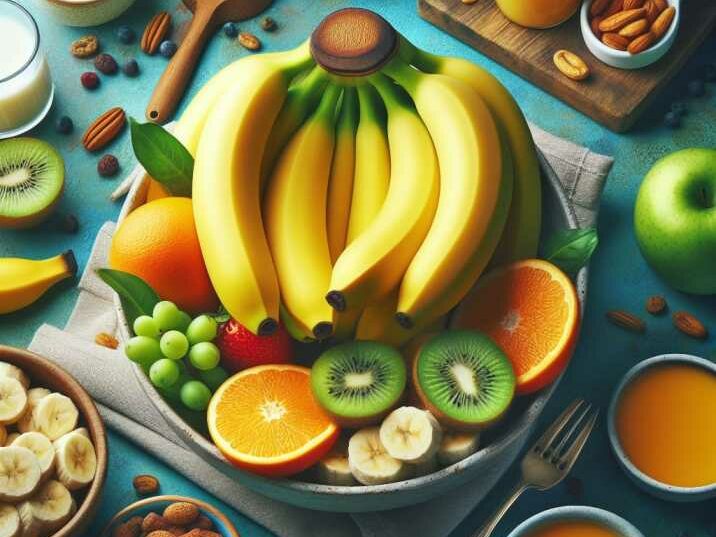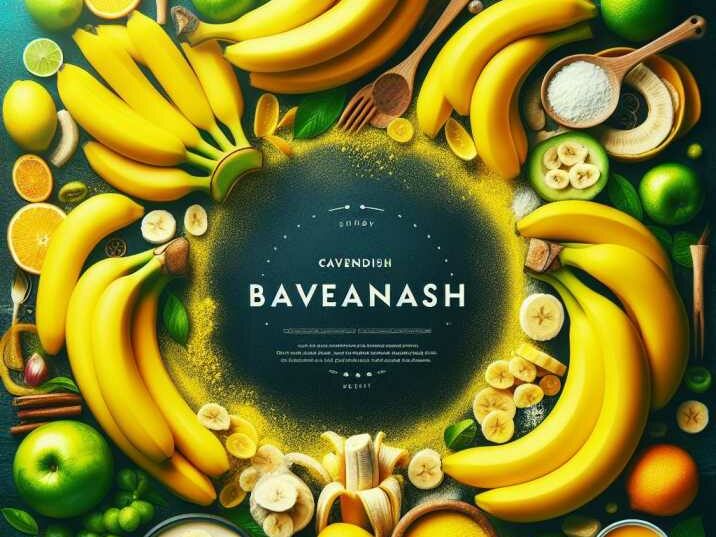Introduction
Table of Contents
Have you ever wondered what makes Cavendish bananas such a beloved fruit worldwide? Apart from their delicious taste and convenient packaging, these yellow wonders are packed with an array of essential nutrients that contribute to overall health and well-being. Let’s discover what are the specific Nutrients Found in Cavendish Bananas?

Specific Nutrients Found in Cavendish Bananas
Vitamin B6: The Energy Booster
Vitamin B6, also known as pyridoxine, plays a crucial role in converting food into energy. It aids in the metabolism of carbohydrates and proteins, ensuring that your body efficiently utilizes the nutrients from your diet. Incorporating Cavendish bananas into your meals can provide a significant portion of your daily vitamin B6 needs, supporting energy production and overall vitality.
Potassium: The Electrolyte Balancer
Potassium is an essential mineral that helps regulate fluid balance, muscle contractions, and nerve signals in the body. Cavendish bananas are renowned for their high potassium content, making them an excellent choice for replenishing electrolytes after exercise or on hot summer days. Including these bananas in your diet can help maintain optimal fluid balance and support proper muscle function.
Vitamin C: The Immune Booster
Vitamin C is a potent antioxidant that plays a vital role in supporting immune function and protecting the body against oxidative stress. While Cavendish bananas are not as rich in vitamin C as citrus fruits, they still provide a notable amount of this immune-boosting vitamin. Incorporating bananas into your diet can contribute to your overall vitamin C intake and help support a healthy immune system.
Dietary Fiber: The Digestive Aid
Dietary fiber is essential for maintaining digestive health and promoting regular bowel movements. Cavendish bananas contain both soluble and insoluble fiber, which helps support digestive function and prevent constipation. Including bananas in your diet can aid in digestion, promote satiety, and support overall gut health.
Magnesium: The Stress Reliever
Magnesium is a vital mineral involved in hundreds of biochemical reactions in the body, including energy production and stress management. Cavendish bananas contain a moderate amount of magnesium, which can help relax muscles, regulate blood pressure, and alleviate stress. Adding bananas to your diet may help promote relaxation and overall well-being.
Manganese: The Bone Builder
Manganese is a trace mineral that plays a crucial role in bone health, collagen production, and wound healing. While needed in small amounts, manganese is essential for maintaining strong and healthy bones. Cavendish bananas provide a modest amount of manganese, contributing to overall bone health and integrity.
Riboflavin (Vitamin B2): The Metabolic Supporter
Riboflavin, also known as vitamin B2, is involved in various metabolic processes, including energy production and antioxidant defense. While Cavendish bananas contain a relatively small amount of riboflavin compared to other nutrients, they still contribute to overall metabolic function and energy production in the body.
Iron: The Oxygen Carrier
Iron is a vital mineral involved in oxygen transport, energy production, and immune function. While Cavendish bananas are not a significant source of iron compared to other foods, they still contain a small amount of this essential nutrient. Incorporating bananas into your diet, along with other iron-rich foods, can help support overall energy levels and vitality.
Folate: The Pregnancy Essential
Folate, also known as vitamin B9, is crucial for proper fetal development during pregnancy. It plays a vital role in DNA synthesis, cell division, and neural tube formation in the developing fetus. While Cavendish bananas are not exceptionally high in folate, they still contribute to overall folate intake and can be part of a healthy pregnancy diet.
Zinc: The Immune Supporter
Zinc is an essential mineral that plays a crucial role in immune function, wound healing, and DNA synthesis. While Cavendish bananas are not a significant source of zinc compared to other foods, they still provide a small amount of this essential nutrient. Including bananas in your diet can contribute to overall zinc intake and support immune health.

In summary, Cavendish bananas are not only delicious but also packed with a wide range of essential nutrients that support overall health and well-being. From vitamin B6 and potassium to vitamin C and dietary fiber, these yellow fruits offer numerous health benefits that make them a valuable addition to any diet. Whether enjoyed as a convenient snack or incorporated into smoothies and baked goods, Cavendish bananas are a versatile and nutritious choice for individuals of all ages.
Conclusion
In conclusion, Cavendish bananas are a nutritional powerhouse, rich in essential vitamins, minerals, and fiber. Incorporating them into your diet can support energy levels, digestive health, and overall well-being. With their delicious taste and versatility, Cavendish bananas are a must-have addition to any healthy eating plan.
Table of Nutritional Information:
| Nutrient | Amount per 100g |
|---|---|
| Vitamin B6 | 0.367 mg |
| Potassium | 358 mg |
| Vitamin C | 8.7 mg |
| Dietary Fiber | 2.6 g |
| Magnesium | 27 mg |
| Manganese | 0.27 mg |
| Riboflavin | 0.073 mg |
| Iron | 0.26 mg |
| Folate | 20 mcg |
| Zinc | 0.15 mg |
Frequently Asked Questions (FAQs):
- Are Cavendish bananas high in sugar? Cavendish bananas contain natural sugars, primarily fructose, which contribute to their sweet taste. However, they are not considered high in sugar compared to processed snacks and desserts.
- Can Cavendish bananas help with weight loss? While Cavendish bananas are nutritious and filling, they should be consumed in moderation as part of a balanced diet for weight management. Their fiber content can promote satiety and aid in digestion, but portion control is key.
- Are there any downsides to eating Cavendish bananas? While Cavendish bananas offer numerous health benefits, some individuals may be allergic to bananas or experience digestive discomfort due to their fiber content. It’s essential to listen to your body and consume bananas in moderation if you experience any adverse effects.
- How should I store Cavendish bananas to prolong their freshness? Cavendish bananas should be stored at room temperature until ripe, and then refrigerated to slow down the ripening process and extend their shelf life. Avoid storing bananas near other fruits, as they release ethylene gas, which can accelerate ripening.
- Can I use Cavendish bananas in cooking and baking? Yes, Cavendish bananas are incredibly versatile and can be used in a variety of recipes, including smoothies, baked goods, pancakes, and savory dishes. They add natural sweetness, moisture, and flavor to dishes, making them a popular ingredient in both sweet and savory recipes.
